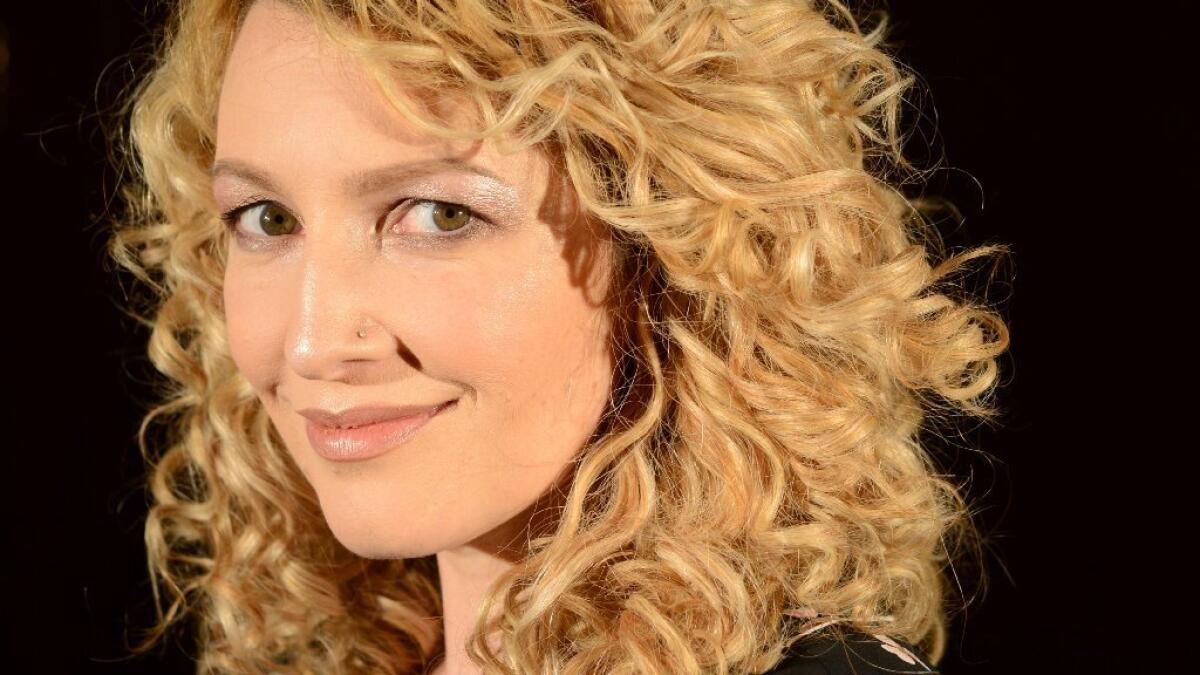How ‘Miss Peregrine’ screenwriter Jane Goldman turned her quirks into a golden Hollywood career

Perhaps it was the time her father brought a VHS tape of David Lynch’s surrealist cult film “Eraserhead” to watch at her 10th birthday party. Or maybe it was when she accosted a magazine editor as a teen, trying to get a job – and succeeded, opting to become a reporter instead of going to college. As a young person, Jane Goldman always knew she was a little bit different.
“I’ve always been drawn to spooky things, to the unusual, to things that are dark but in a friendly way,” Goldman said.
That eccentricity proved an asset on the English screenwriter’s latest project, an adaptation of Ransom Riggs’ bestselling 2011 young adult novel, “Miss Peregrine’s Home for Peculiar Children,” directed by the official auteur of outsiders and weirdos, Tim Burton.
“She’s definitely a peculiar person,” Burton said of Goldman, bestowing what counts as the highest of compliments from the director of “Beetlejuice,” “Ed Wood” and “Alice in Wonderland.” “She’s very intelligent, very creative, very outgoing but very internal as well.”
“Miss Peregrine’s Home for Peculiar Children,” which opens Friday, stars Asa Butterfield as Jake, a contemporary Florida boy investigating his grandfather’s World War II connection to an orphanage full of children with mysterious powers. Eva Green is Miss Peregrine, the loving headmistress to the motley brood, which includes a girl who can float on air, a boy with a beehive in his stomach and a girl with an extra mouth in the back of her head. Samuel L. Jackson is a terrifying undead creature who hunts “peculiars,” as they’re called, with a penchant for eating human eyeballs.

The trailer for Tim Burton’s “Miss Peregrine’s Home For Peculiar Children,” starring Eva Green.
The book, which was inspired by a collection of vintage photos Riggs found at flea markets and yard sales, has a vivid, spooky sense of atmosphere that Goldman and Burton were determined to uphold.
“Both of us felt very strongly about keeping a sense of mystery and not falling into a typical YA story where the hero has a goal and a destiny,” said Goldman, 46. “We wanted it to play out more like a strange dream in terms of tone. Tim didn’t want this to be about children with superpowers. He wanted them to be different and ostracized.”
Goldman’s best known previous work is her scripts for director Matthew Vaughn, many of which brought a freshness and clarity to genres that can easily get muddled and musty. She co-wrote Vaughn’s gleefully profane superhero comedy “Kick-Ass,” his slickly imaginative “X-Men: First Class,” and subversively funny spy film “Kingsman: The Secret Service.”
Critics praised Goldman’s first solo script, an adaptation of the horror novel “The Woman in Black,” for its goth sense of atmosphere. Another adaptation she wrote, the British horror-thriller “The Limehouse Golem,” recently screened at the Toronto International Film Festival and is awaiting a U.S. distributor.
Almost all of her work is adaptations, a form she loves.
“I see my role as a translator, telling the story that’s in the book using the more visual language of film,” Goldman said. “I like looking at a book and asking myself, ‘How do I replicate that experience I just had as a reader?’”
Burton knew Goldman socially first, through her husband, English TV host Jonathan Ross, with whom she has three children, ages 25, 22 and 19. The director calls the elaborate, spooky Halloween parties the couple throws “epic,” a bit of flattery from this horror auteur akin to having Woody Allen laugh at your joke.
She’s very shy but also very punk rock and bold. When I met her she had fuchsia hair.
— Jenno Topping, producer
It was Jenno Topping, who produced “Miss Peregrine’s” for Chernin Entertainment, who suggested the two team up on the film.
“They are kindred spirits,” Topping said of Goldman and Burton. “I felt like I was bringing this gift to each of them.
“Tonally, Jane so understands the outsider spirit,” Topping said. “She’s very shy but also very punk rock and bold. When I met her she had fuchsia hair. And yet she’s a mom. And she does these really muscular movies with Matthew Vaughn.”
In adapting Riggs’ novel, Goldman made a few changes, swapping the lead female character from one who can control fire (who remains in the story in a smaller role) to the one who can levitate and control air, a peculiarity the screenwriter thought lent itself to more visual invention. She dreamed up a particularly fantastical third-act set piece inspired by Ray Harryhausen’s stop-motion visual effects work in 1963’s “Jason and the Argonauts.” She and Burton share taste and references, including an affection for Harryhausen.
“It’s nice to know you’re gonna be pushing at an open door, rather than that you’d be pitching an idea like that to Terrence Malick,” Goldman said, of sharing the same dark sense of whimsy as her director.
Born in London, the only child of a real estate developer and a homemaker, Goldman began writing as an entertainment journalist for English teen publications like “Just Seventeen” and “Smash Hits.” She wrote books on the “X-Files” and a well reviewed novel, “Dreamworld,” about a female security officer who investigates a murder-suicide at a Florida theme park. In 2007, Goldman co-wrote her first screenplay with Vaughn, an adaptation of Neil Gaiman’s romantic fantasy “Stardust,” after Gaiman, a friend, introduced her to the director.
The idea that you could make a living from writing always thrilled me. I was very focused when I was younger, but I hope I wasn’t annoying about it.
— Jane Goldman
“The idea that you could make a living from writing always thrilled me,” Goldman said. “I was very focused when I was younger, but I hope I wasn’t annoying about it.”
She writes from an office overlooking a garden in her London home, usually six or seven hours a day, but up to 16 when a director is anxiously awaiting a draft, as on “X-Men: First Class” when Vaughn needed to quickly get into production.
As a woman writing genre movies for major studios, she is a relative rarity, and much of her work, including “Miss Peregrine’s” and “Kick-Ass,” which controversially featured Chloe Grace Moretz as a child vigilante, includes unconventional female characters who are active players in the action.
“I probably feel more of a responsibility to make sure female characters are dimensional,” Goldman said.
Goldman’s upcoming projects include “Kingsman: The Golden Circle,” a sequel to Vaughn’s successful spy film, due next June from 20th Century Fox, and a take on the Daphne du Maurier novel “Rebecca,” memorably adapted by Alfred Hitchcock in 1940. Though daunted by the legacy of the Hitchcock version, Goldman said she was interested to read that the powerful English director was prevented from making the film he wanted to make due to the censorship of the Motion Picture Production Code.
“I adored the novel’s moral ambiguity,” Goldman said. “That it makes you question why you’re rooting for the characters you’re rooting for. Hitch wanted to do things he wasn’t allowed to do because of the Hays code, which said people needed to be punished for bad things they did. I think if he could have taken another crack at it, he would have.”
See the most-read stories in Entertainment this hour »
Follow me on Twitter for more movie news: @thatrebecca
ALSO:
Review: The Tim Burton magic is back with ‘Miss Peregrine’s Home for Peculiar Children’
‘Miss Peregrine’ expected to top ‘Deepwater Horizon’ and ‘Magnificent Seven’ at the box office
More to Read
Only good movies
Get the Indie Focus newsletter, Mark Olsen's weekly guide to the world of cinema.
You may occasionally receive promotional content from the Los Angeles Times.







